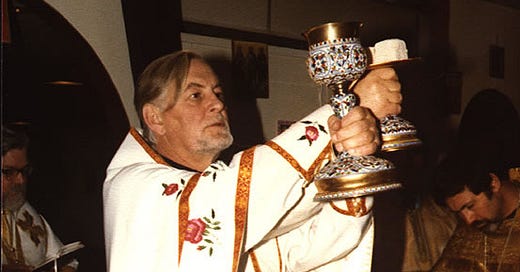Memory Eternal, Fr. Schmemann.
A lot going on in our collective family right now which has cut off Substacking. Everyone here in the house would appreciate your prayers as we try to process and ride out a health crisis. I do not tend discuss the personal on social media—even good places like this. “This ain’t Oprah,” as I was wont to say in the early 2000s.
But I can give you book recommendations: First, A Voice For Our Time by the late Orthodox Protopresbyter Alexander Schmemann. Schmemann was the son of emigres fleeing the Soviet Union who grew up in France before coming to the United States. He is most famous in Western circles for his writings on the Divine Liturgy.
In fact, those same writings make him a controversial figure among some of the Orthodox. His studies led him to discern levels of development within the Liturgy, which is probably a fair cop. It also led him to a bit of equivocating about the Liturgy as it currently exists, making a case for reform by noting the complexity of the rubrics and how the “twenty four heavy books” used to celebrate the Liturgy can be hard to align. In some of his writings (e.g., The Liturgy of Death) [the funeral rites] he creeps right up to the line of suggesting reform before recoiling back and telling his brother priests to celebrate the treasures of the Liturgy with more fervor.
[As an aside, the chaotic changes in the Roman liturgy have been noted with alarm by Orthodox writers, and it is clear that the Western example haunts all thoughts of liturgical reform in the Eastern churches. The “Teal Terror” reformed Ruthenian (Byzantine) Catholic missal in the early 2000s is another bad datapoint from the Orthodox perspective.
From my perspective, liturgical studies can devolve into a version of critical biblical studies, focusing on dating, sources, forms, etc. Subjects which keep the scholars in chairs but do not help those in their pews on Sundays or during the weekdays.]
Back to the topic: Schmemann broadcast half-hour talks beamed into Soviet Russia by Radio Liberty for more than twenty years, starting shortly after the death of Stalin. Schmemann became dean of Saint Vladimir’s Seminary in 1962 and held that post until his death from cancer in 1983. The talks were collected and transcribed after his death, a sometimes-difficult process requiring something like archaeology and assisted by providential discoveries.
Each talk is a marvel of compression, catechizing a people who had limited access to sacraments from a church crawling with KGB spies. The Ten Commandments, the Mysteries, prayer, the Beatitudes, parrying atheist arguments—Schmemann could do it all.
He also conducted a lengthy series on Russian literature and culture, which I also recommend. These talks were almost not given. There was a dispute between the emigre generation and the more liberal second generation at Radio Liberty. The younger Russians wanted to focus more on rights and liberties. Schmemann and his generation argued that it was not enough to speak only of freedom—rooting any idea of liberty in Russian soil required reminding Russians of their roots. Time has proven Schmemann correct.
One of the most striking features of A Voice For Our Time is that the talks have an uncomfortable relevance to Christians in the 21st Century West. While there is no official atheism here, the concept of religious liberty barely resonates in elite circles, and when it does, it curbs it into “freedom of worship.” And even then, stay in your lane.
Instead, materialism is the order of the day. What we experience in the material world is what matters, and that similarity with the old Soviet system is obvious. However, Western materialism can at least reliably deliver material goods. Which makes it more effective in eroding the spiritual dimension of life. As long as the material distractions are there, we can do a reasonably good job of shutting out the transcendent. And so it will go, at least until the debt monster comes knocking.
Schmemann recognized that the material cannot be the end-all be-all long term. Man does not live by bread alone, and the talks meet that need for more, for both bread-line Soviets and video-console-and-shoe-release-line Americans.





First of all praying for your family’s health challenges . We have a few of our own (one chronic). Sounds like a fantastic book - will have to add it to the overflowing piles. 🙏🏻🙂
Grappling with health challenges here, too. Prayers for those.
Big fan of Schmemann & Hopko. Doing lots of Liturgical studies now, incorporating Church Fathers and modern scholars like Raya, Taft, Calivas, & Muksuris in addition to the aforementioned Russian/American influencs.
Would love to chat with you about the "Teal Terror" at greater length, one of these days. As a Ruthenian I've met people who love it, people who hate it, and people who are unaware of any controversy.
I'm of the opinion it was, on balance, a good and necessary reform especially in light of reviewing the texts it replaced (which, Slavonic aside, we're all helplessly Latinized).